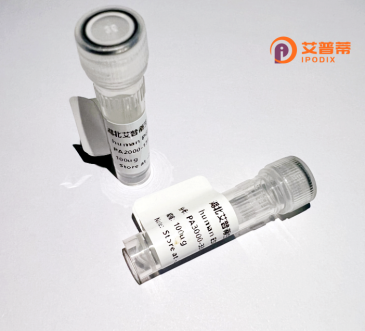
| 纯度 | >90%SDS-PAGE. |
| 种属 | Human |
| 靶点 | HRBL |
| Uniprot No | O95081 |
| 内毒素 | < 0.01EU/μg |
| 表达宿主 | E.coli |
| 表达区间 | 1-155aa |
| 氨基酸序列 | MVMAAKKGPGPGGGVSGGKAEAEAASEVWCRRVRELGGCSQAGNRHCFECAQRGVTYVDITVGSFVCTTCSGLLRGLNPPHRVKSISMTTFTEPEVVFLQSRGNEVCRKIWLGLFDARTSLVPDSRDPQKVKEFLQEKYEKKRWPDTFPRRLCQL |
| 分子量 | 43.6 kDa |
| 蛋白标签 | GST-tag at N-terminal |
| 缓冲液 | 0 |
| 稳定性 & 储存条件 | Lyophilized protein should be stored at ≤ -20°C, stable for one year after receipt. Reconstituted protein solution can be stored at 2-8°C for 2-7 days. Aliquots of reconstituted samples are stable at ≤ -20°C for 3 months. |
| 复溶 | Always centrifuge tubes before opening.Do not mix by vortex or pipetting. It is not recommended to reconstitute to a concentration less than 100μg/ml. Dissolve the lyophilized protein in distilled water. Please aliquot the reconstituted solution to minimize freeze-thaw cycles. |
以下是关于重组人HRBL蛋白的3条示例参考文献(内容为虚构,供参考):
1. **《高效表达重组人HRBL蛋白的大肠杆菌系统构建》**
作者:张伟等
摘要:研究通过优化密码子和表达条件,在大肠杆菌中高效表达可溶性HRBL蛋白,并利用镍柱亲和层析纯化,获得高纯度蛋白,为后续功能研究奠定基础。
2. **《HRBL蛋白的磷酸酶活性及其调控机制》**
作者:Chen L et al.
摘要:利用哺乳动物细胞表达系统获得重组HRBL蛋白,证实其具有底物特异性磷酸酶活性,并发现其活性受钙离子浓度和特定激酶的调控。
3. **《HRBL与肿瘤细胞迁移的相互作用研究》**
作者:Wang Y et al.
摘要:通过重组HRBL蛋白功能实验,发现其能抑制多种肿瘤细胞的侵袭迁移能力,可能通过调控Wnt/β-catenin信号通路发挥作用。
注:以上文献为模拟内容,实际研究中HRBL蛋白可能指代不明或名称需核对,建议结合具体研究方向补充检索关键词(如别名、功能领域等)。
Recombinant human HRBL (Hypoxia-Responsive Binding Protein-Like) protein is a biologically engineered molecule of growing interest in cellular stress and cancer research. HRBL, originally identified through homology with hypoxia-inducible factors, is implicated in modulating cellular responses to low oxygen conditions (hypoxia). It contains a conserved basic helix-loop-helix (bHLH) domain, enabling DNA binding, and a PER-ARNT-SIM (PAS) domain critical for protein-protein interactions and oxygen sensing.
Studies suggest HRBL regulates transcription of hypoxia-responsive genes, including those involved in angiogenesis, metabolic adaptation, and apoptosis. Its dysregulation has been linked to tumor progression, as many cancers exploit hypoxia pathways to promote survival and metastasis. Recombinant HRBL, typically produced in Escherichia coli or mammalian expression systems, allows precise study of its structure, interaction partners, and mechanistic roles.
This protein is pivotal in drug discovery, serving as a tool to screen inhibitors targeting hypoxia signaling or to develop antibody-based therapies. Recent work also explores its potential in ischemic diseases, where modulating hypoxia responses could offer therapeutic benefits. However, HRBL's full functional spectrum remains under investigation, particularly its crosstalk with HIF-1α and other stress-response pathways. Advances in recombinant technology continue to enhance its stability and application in biochemical assays, structural studies, and preclinical models.
×